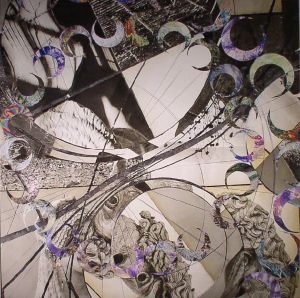Back in stock: Post Rock/Experimental
Post Rock/Experimental vinyl represses and restocks
Items 1 to 35 of 35 on page 1 of 1
Review: Acopia's second album is a captivating journey through diverse electronic landscapes, blending Balearic and downtempo styles with atmospheric depth. Opening track 'We Evolve' sets a haunting tone with its echoey soundscapes and ethereal vocals, creating a serene yet mysterious atmosphere. 'Be Enough' follows, adding a slight techno edge, blending smooth electronica with subtle rhythmic pulses. The vibrant 'Holding On' channels synth-pop and synthwave influences, offering a nostalgic 80s vibe, while 'What I've Been Looking For' builds on dynamic electronica with a stronger retro energy. 'Take You For Granted' slows things down, leaning into a chill-out mood with a mellow, reflective sound, while 'This Conversation Is Getting Boring' introduces a melancholic drum & bass rhythm that reflects a deeper emotional undertone. Acopia successfully crafts a rich downtempo album. The Australian act continues to evolve, offering a record filled with thoughtful nuances and sound textures.
… Read more in stock ₺1.175,98
In A Safe Place (20th Anniversary Edition) (B-STOCK) (limited "safe place swirl" blue marbled vinyl LP + insert)
Cat: SP 640C (B-STOCK). Rel: 01 Jan 90
B-STOCK: Sleeve damaged but otherwise in excellent condition
in stock ₺1.142,74
Cat: PCD 012. Rel: 19 May 25
in stock ₺857,32
in stock ₺1.341,12
in stock ₺1.110,03
I Can Hear The Grass Grow (green vinyl LP limited to 300 copies)
Cat: ELP 088. Rel: 19 May 25
in stock ₺1.230,85
in stock ₺1.186,53
Crucible (reissue) (LP + MP3 download code)
Cat: CR 2292/FTR796. Rel: 31 Mar 25
in stock ₺1.110,03
Live 1980-85 (2xCD with obi-strip)
Cat: FJSP 527. Rel: 29 Apr 25
in stock ₺1.439,77
in stock ₺1.054,64
Calculating Infinity (reissue) (limited orange, silver & black vinyl LP + insert)
Cat: RR 51761. Rel: 27 Jun 24
Review: In the mid-90s while the hardcore punk scene witnessed both an influx of more melodious acts as well as those injecting the scene with as much metallic bite as possible, few could have been prepared for the utter assault on the senses The Dillinger scape Plan were cooking up. Often cited as the one of the pioneering acts in the mathcore subgenre (combining the unhinged intensity of hardcore with the compositional dexterity of math rock), 1999's Calculating Infinity is still regarded to this day as one of the most uncompromising, impenetrable, and challenging debuts in alternative, punk or metal. Their only full-length with original vocalist Dimitri Minakakis before his departure and subsequent replacement by the admittedly much more dynamic Greg Puciato, and pre-dating their experimental collaborative EP with Faith No More/Mr. Bungle mastermind Mike Patton; the material here does little to offer any sonic respites of glitched out synth ambience or even a melodious hook. Rather, it lays down a highly complex blueprint of odd time signatures, polyrhythms, dissonant breakdowns, jazz freakouts and caustic vocal howls that would inspire an entirely new wave of outsiders who felt hardcore and metal just weren't vicious or experimental enough on their own merits.
… Read more in stock ₺1.000,30
Pillar Of Fire (10" (indie exclusive))
Cat: DC 617. Rel: 24 Apr 25
Review: Out of stoner rock miasma traipse David Eugene Edwards (Wovenhand, 16 Horsepower) and Al Cisneros (OM, Sleep) with two new sludge-offs, 'Pillar Of Fire' and 'Capernaum'. With leeward, mountainous horror vacui depicted on the front cover - and a 10" press signifying that the musicians intend for this to be a maestro's statement, not too invested in the magnanimity of a full LP and yet still knowing full well that you'll lap up the sense of terse completion such a record promises - these tracks are estivate delights, both their meditative experimental-bass workings evoking barren, anxious wanderlust.
… Read more in stock ₺1.132,19
Adela (LP + MP3 download code)
Cat: MORC 93. Rel: 16 May 25
in stock ₺1.186,53
in stock ₺549,74
Hinterland (Deluxe Edition) (B-STOCK) (orange splattered vinyl LP + CD + DVD + book in hard-back book sleeve)
Cat: TJMBK 01 (B-STOCK). Rel: 01 Jan 90
B-STOCK: Creasing to corner of outer sleeve but otherwise in excellent condition
in stock ₺2.923,86
! low stock ₺747,06
in stock ₺857,32
in stock ₺1.088,40
Review: ML Buch's new album pushes her experimental pop into new realms and ably builds on the expansive guitar work and catchy melodies introduced in her 2017 debut EP, 'Fleshy'. Her distinctive sound combines synthetic MIDI textures with heartfelt songwriting and ethereal vocals that evoke the fluidity of intimacy in a digital world. Through tender tracks like 'I'm A Girl You Can Hold IRL' and 'Can't Get Over You With You,' the artist takes listeners beneath the skin and explores a visceral, surreal world. Panoramic visuals captured via a pill camera mirror this exploration in a blend of technology and human emotion this is truly unique.
… Read more in stock ₺747,06
in stock ₺1.538,43
Birthday Song (gold vinyl 7" limited to 250 copies)
Cat: JOEY 002. Rel: 22 May 25
in stock ₺527,06
in stock ₺824,61
Odin's Raven Magic (heavyweight vinyl 2xLP in spot-varnished sleeve)
Cat: 019029 6827204. Rel: 04 Dec 20
Review: It should come as no surprise that the latest from Icelandic musical fantasists Sigur Ros was originally composed in either the 14th or 15th Century, and is written in the Edda tradition, a term used to describe to manuscripts that together make up the main sources of Norse mythology and Skaldic poetry. After all, this is a band that have been singing in their own imagined tongue since before most people cottoned on to them.
It's certainly the group's most gothic effort to date, an orchestral epic that also features the artists and composers Hilmar Orn Hilmarsson, Steindor Andersen and Maria Huld Markan Sigfusdottir, whose collective CV includes pioneering musical composition with computers and Rimur chanting. Their combined efforts feel steeped such timeless atmosphere your peripheral vision might as well be catching torchlights flickering off solid stone walls. Another work of extraordinary beauty, then.
… Read moreIt's certainly the group's most gothic effort to date, an orchestral epic that also features the artists and composers Hilmar Orn Hilmarsson, Steindor Andersen and Maria Huld Markan Sigfusdottir, whose collective CV includes pioneering musical composition with computers and Rimur chanting. Their combined efforts feel steeped such timeless atmosphere your peripheral vision might as well be catching torchlights flickering off solid stone walls. Another work of extraordinary beauty, then.
in stock ₺890,56
in stock ₺472,71
Hopelessness & Shame (remastered) (yellow vinyl LP)
Cat: SSRA 58A1. Rel: 26 Mar 25
in stock ₺1.022,46
The Complete Recordings 1981-1984 (3xSHM-CD + Blu-ray with obi-strip)
Cat: POCS 9221. Rel: 09 May 25
in stock ₺2.824,68
Eg Er Framand (reissue) (gatefold silver vinyl 12" limited to 200 copies)
Cat: 822603 00483. Rel: 16 May 25
in stock ₺1.484,09
Review: Nearly a decade since the Swedish trio's last full-length Casino (2014), brothers Andreas and Johan Berthling, along with Tomas Hallonsten, ease back into the fold with Preludes, a five-track collection that reaffirms their mastery of delicate, genre-blurring soundscapes. Following the promising 'Refrains' 10" in 2023, this new release is a comforting reminder that Tape's signature blend of acoustic instrumentation and electronic processing remains as singular and stirring as ever, as they continue to weave hypnotic textures that feel both ethereal and earthy. 'Opener Lights Out' is a tender folk threnody where repeating guitar patterns create a meditative haze. 'Naukluft Plateau' drifts with ruminative piano over cascading tones, while the brief 'Golden Gain' mixes huffing harmonium and subtle electronic scrums. 'Tangential Thoughts' is quintessential Tape, a dreamy two-chord motif, rustling organ and delicate percussion all evoking wistful reveries. The closing track, 'On The Accordion Bus', sways with glitch-like textures and gentle rhythms, blurring the line between transit and reflection. There's a unique warmth to their balance of melody and abstraction here, reminiscent of Aphex Twin's ambient pop or Susumu Yokota's textural elegance. Praise indeed, but sometimes the quietest returns make the deepest impact.
… Read more in stock ₺790,85
Review: Southend's These New Puritans have a rare ability to create goosebump-inducing music. A big part of is is Jack Barnett's voice, which is truly up there with the likes of Thom Yorke and Hayden Thorpe's in terms of being able to tug at the heartstrings and create grandiose spellbinding atmospheres. Plus, the arrangements that accompany it are of elite level and taste. This new album is their fifth studio album since forming in 2006 and offers plenty in the way of diversity. 'A Season In Hell' is a wild mix of industrial, organ music, trip-hop and choir sounds. Elsewhere, 'Bells' is less intense and let's the atmosphere form gradually and luxuriously. If you want a record to properly blow your socks off, let it be this.
… Read more in stock ₺472,71
in stock ₺1.000,30
in stock ₺1.439,77
Tarot (reissue) (B-STOCK) (gatefold 180 gram vinyl 2xLP)
Cat: KK 2258003 (B-STOCK). Rel: 01 Jan 90
B-STOCK: Sleeve damaged but otherwise in excellent condition
Review: ***B-STOCK: Sleeve damaged but otherwise in excellent condition***
The 70s were a superb time for Krautrock and Walter Wegmuller's Tarot from 1973 is one of the classics. Now for the first time, it has been remastered from the original tapes and comes in a no doubt highly sought after deluxe box set. Bern born Wegmuller was the son of Roman travelers and himself spent much time roaming around Europe and India making jewelry as well as painting. Helping him to record this album when he settled back in Bern were legends of the scene like Klaus Schulze, Ash Ra Tempel members Manuel Gottsching and Hartmut Enke, and other musicians known as The Cosmic Jokers.
… Read moreThe 70s were a superb time for Krautrock and Walter Wegmuller's Tarot from 1973 is one of the classics. Now for the first time, it has been remastered from the original tapes and comes in a no doubt highly sought after deluxe box set. Bern born Wegmuller was the son of Roman travelers and himself spent much time roaming around Europe and India making jewelry as well as painting. Helping him to record this album when he settled back in Bern were legends of the scene like Klaus Schulze, Ash Ra Tempel members Manuel Gottsching and Hartmut Enke, and other musicians known as The Cosmic Jokers.
in stock ₺2.022,23
in stock ₺878,95
Numbers (Record Store Day RSD 2024) (limited gatefold LP + booklet in lenticular sleeve)
Cat: DH 0025. Rel: 29 Apr 24
Review: The concept album is a divisive, err, concept. So often are we overwhelmed at the length of sleeve notes that make such little tangible sense it feels like falling through a wall of ketamine on acid, it almost makes us approach all sleeve notes with trepidation. Then you have records that have a bat shit crazy idea behind them, but convey it quite succinctly. Or at least in terms of the vital information you need to know. A few years before his own spiritual journey led him to Islam, Cat Stevens, later Yusuf, gave us Numbers, which is frankly the best type of concept album. Playing out like a surreal rock opera, of sorts, it's the soundtrack to a planned book, The Pythagorean Theory Tale, which tells of a planet, Polygor, on which there's a castle with a number machine, there to churn out new numbers and distribute these across the galaxy. Does it make sense? No. Do we grasp the fundamentals? Yes. Is it fantastic? Most certainly.
… Read more in stock ₺1.395,98
Illinois Glossolalia (LP)
Cat: FTR 285LP. Rel: 29 Nov 16
in stock ₺1.186,53
Items 1 to 35 of 35 on page 1 of 1

 TRY
TRY








































